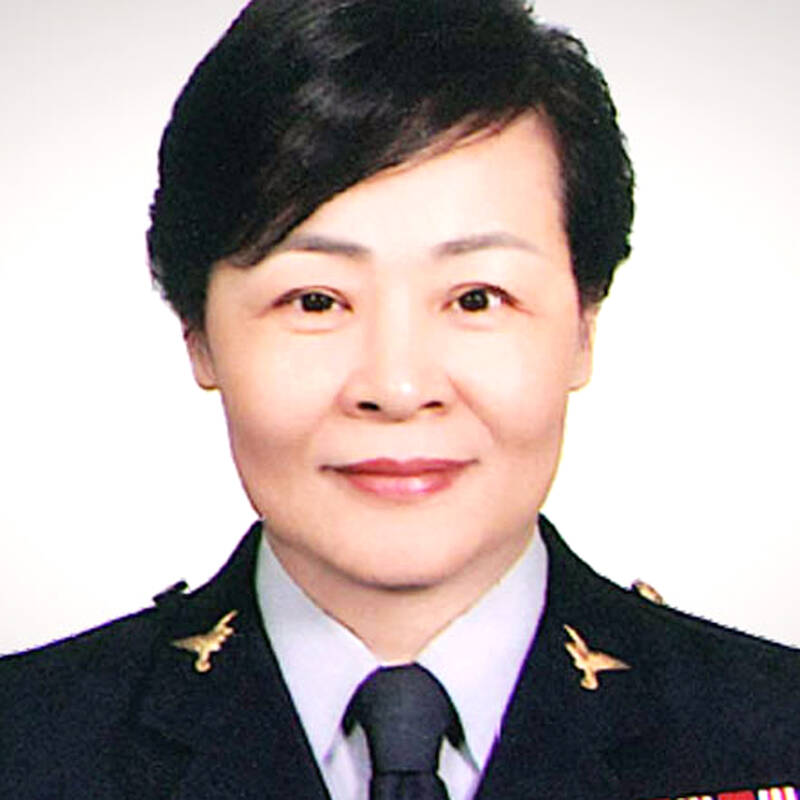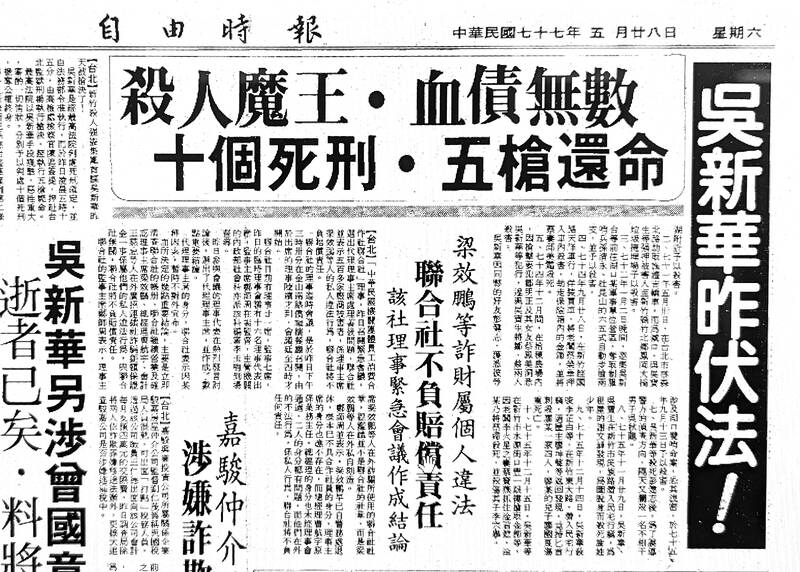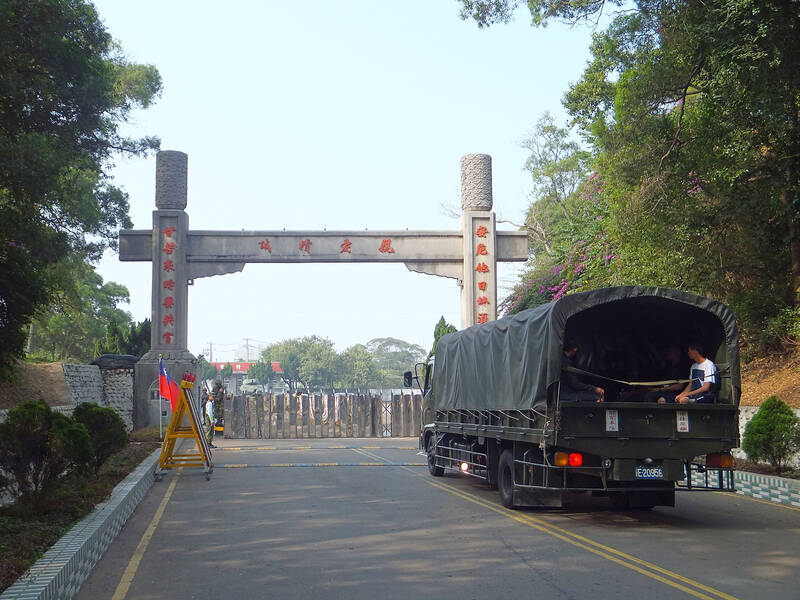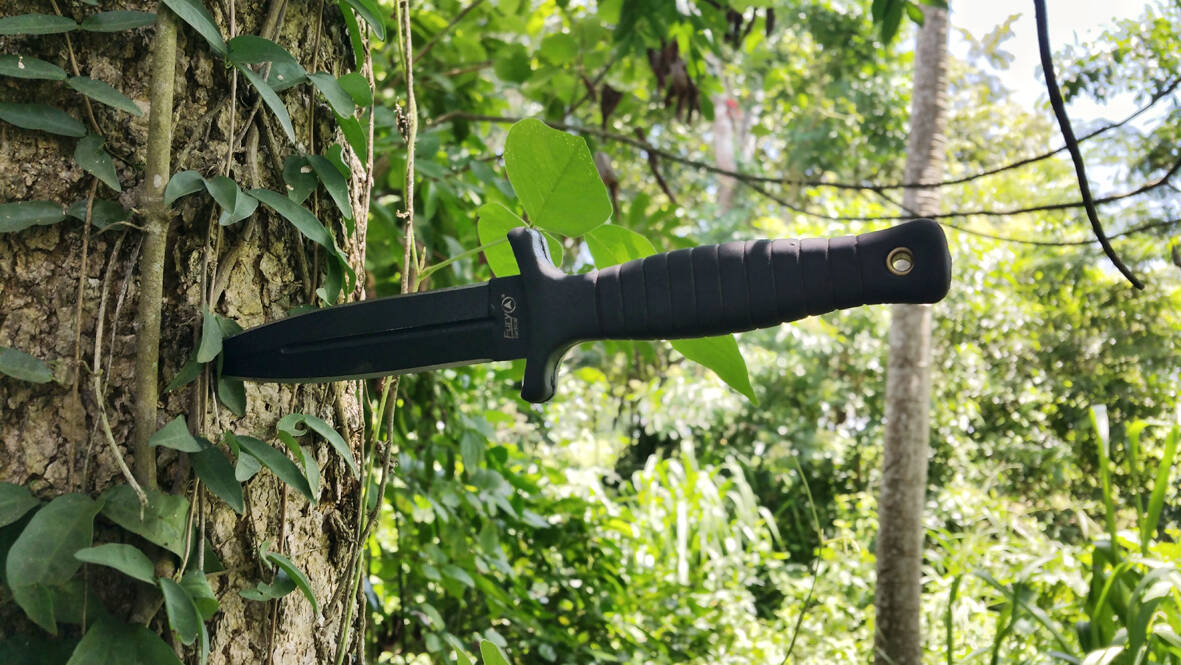May 22 to May 28
Lee Li-chuan (李莉娟) nervously chewed stick after stick of gum on her way to meet with Wu Hsin-hua (吳新華), Taiwan’s most notorious criminal during the early 1980s. She rarely chewed gum — or wore makeup — but the 32-year-old officer had to maintain the facade as the wife of Uncle Yung, a fictitious arms dealer who had successfully lured the elusive Wu out of his mountain hideout.
Lee was supposed to carry out the mission with veteran cop Lin Lai-fu (林來福), who was playing the role of Uncle Yung, but Wu insisted that she come alone. They met up and headed to the Taizi Hotel (太子飯店) in Taoyuan City, where the deal was supposed to take place, but a drunken brawl had broken out at the entrance, causing Wu to hesitate. Lee convinced Wu to not waste his trip and head upstairs when the “middleman” they were with attempted to flee. Lee thought that the operation was blown and that her life could end any second, as the ruthless Wu was known for his lightning-quick knife skills.

Photo: Taipei Times file photo
According to a United Daily News report, the middleman suddenly turned around, and before Wu could notice something was off, they entered room 301 where Lin was waiting as Uncle Yung. Wu opened his coat to reveal that he was armed with knives, darts, a fake gun and a grenade, but Lin managed to distract him and knock him to the ground, upon which the support jumped out of hiding and subdued him.
The police wanted Wu alive, as there were more than a dozen murder cases he was suspected of committing between 1982 and his arrest on Dec. 3, 1987. He confessed to 10 cases involving at least 14 victims and attempted suicide with poison in the interrogation room before being stopped. Wu told reporters that he had killed so many people that he lost count, but denied involvement in an unsolved bank robbery that claimed the lives of two policemen.
On May 27, 1988, Wu was executed by shooting. However, because his heart was located toward the right side of his body, it took five bullets to kill him. The 10 death sentences he received remains a national record.

Photo: Liberty Times
LIFE OF CRIME
Wu grew up in a military dependents village in Hsinchu alongside six siblings, two of whom became his partners in crime and were also sentenced to death. According to news reports, since the children roamed the area without supervision, neighbors would frequently blame them when their things went missing. Wu’s father severely beat him after each incident — whether or not he was guilty.
He told reporters after his arrest that his life of crime began with the theft of a guava when he was around 10 years old, for which he was roughed up by the cops. He was furious at the treatment, and decided to start killing people for revenge, noting that he had given up hope for a bright future by then.

Photo: Taipei Times file photo
Wu struggled to support his wife and child running a shaved ice stall, so around 1981, he and his gang began breaking into houses on weekends. These escalated into robberies, and finally in April 1982, they carjacked a man in a suit driving an expensive car and took him to an isolated area in Miaoli County. After discovering that the man was just a driver and had little money, Wu stabbed him to death.
After committing another similar crime in Taipei, Wu decided that they needed to acquire some firearms to rob a bank. They targeted the military base in Hsinchu County’s Hukou Township (湖口), where they noticed that one isolated entrance was guarded by just two soldiers. The gang approached them in a car pretending to ask for directions, then killed them and stole two rifles and a large amount of ammunition.
HIDING IN THE HILLS

Photo courtesy of Pxfuel
Wu’s acts became increasingly brazen, at one point murdering two people in broad daylight on consecutive days in September 1986. He was deadly with his knives, which he allegedly fashioned and sharpened himself. Several victims were accomplices whom he silenced after suspecting that they would sell him out.
The gang’s final known heist took place in December 1986, where they robbed a jewelry store and killed the owner’s wife in the process. Several members were caught, and Wu began his life on the run. After injuring a highway patrolman with an army rifle, he disappeared.
Wu told reporters after his arrest that for the previous year, he had been hiding in two underground caves that he dug in the bamboo forest near Fo Guang Shan Monastery (佛光山). He subsisted on basic provisions and rarely went out; when he did he made sure he was always clean shaven, and carried a book with him to appear scholarly. He spent his time reading, listening to the radio and practicing his knife skills.
He said he chose the location because he wanted to find some peace of mind after killing so many people, and he would recite the Nilakantha Dharani (Great Compassion Mantra) regularly to help transmute the souls of his victims. He even recited a section in front of the reporters, and the police found incense sticks and an altar in one of the caves. However, another report indicated that Wu wanted to be closer to his wife and daughter in Kaohsiung.
UNDERCOVER TRAP
Wu appeared in the Hsinchu area at least three times during this period, each time triggering a massive police effort to arrest him.
In December 1987, the police suspected that Wu had emerged from hiding and returned to the area, and they hatched their plan to lure him in with undercover agents pretending to sell guns. Since Wu was very cautious, they wanted a female cop to participate in the operation so he would lower his guard. Lee volunteered for the task.
She was meant to carry out the task with Lin, but Wu insisted on meeting her alone with the middleman. This added a huge amount of risk, but Lee did not shirk from the mission. They met up in Taoyuan, and Wu paid Lee the cash first. Newspaper accounts say that she counted the money like a seasoned dealer, which further fooled him.
Wu asked her to get in the car and ride to the hotel together, but Lee insisted on riding her bicycle there on their own as she thought it was too dangerous. Wu only agreed when she threatened to cancel the deal, and followed her in his car.
Only when Wu saw Lee again in the police station after his arrest did he realize that he was tricked. Lee later became Taiwan’s first female precinct head.
Taiwan in Time, a column about Taiwan’s history that is published every Sunday, spotlights important or interesting events around the nation that either have anniversaries this week or are tied to current events.

April 14 to April 20 In March 1947, Sising Katadrepan urged the government to drop the “high mountain people” (高山族) designation for Indigenous Taiwanese and refer to them as “Taiwan people” (台灣族). He considered the term derogatory, arguing that it made them sound like animals. The Taiwan Provincial Government agreed to stop using the term, stating that Indigenous Taiwanese suffered all sorts of discrimination and oppression under the Japanese and were forced to live in the mountains as outsiders to society. Now, under the new regime, they would be seen as equals, thus they should be henceforth

Last week, the the National Immigration Agency (NIA) told the legislature that more than 10,000 naturalized Taiwanese citizens from the People’s Republic of China (PRC) risked having their citizenship revoked if they failed to provide proof that they had renounced their Chinese household registration within the next three months. Renunciation is required under the Act Governing Relations Between the People of the Taiwan Area and the Mainland Area (臺灣地區與大陸地區人民關係條例), as amended in 2004, though it was only a legal requirement after 2000. Prior to that, it had been only an administrative requirement since the Nationality Act (國籍法) was established in

With over 100 works on display, this is Louise Bourgeois’ first solo show in Taiwan. Visitors are invited to traverse her world of love and hate, vengeance and acceptance, trauma and reconciliation. Dominating the entrance, the nine-foot-tall Crouching Spider (2003) greets visitors. The creature looms behind the glass facade, symbolic protector and gatekeeper to the intimate journey ahead. Bourgeois, best known for her giant spider sculptures, is one of the most influential artist of the twentieth century. Blending vulnerability and defiance through themes of sexuality, trauma and identity, her work reshaped the landscape of contemporary art with fearless honesty. “People are influenced by

The remains of this Japanese-era trail designed to protect the camphor industry make for a scenic day-hike, a fascinating overnight hike or a challenging multi-day adventure Maolin District (茂林) in Kaohsiung is well known for beautiful roadside scenery, waterfalls, the annual butterfly migration and indigenous culture. A lesser known but worthwhile destination here lies along the very top of the valley: the Liugui Security Path (六龜警備道). This relic of the Japanese era once isolated the Maolin valley from the outside world but now serves to draw tourists in. The path originally ran for about 50km, but not all of this trail is still easily walkable. The nicest section for a simple day hike is the heavily trafficked southern section above Maolin and Wanshan (萬山) villages. Remains of